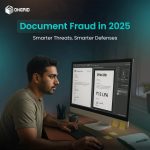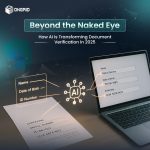Table of Contents
ToggleIntroduction
Educational qualifications act as a vital filter in recruitment. But what if those degrees and diplomas are forged? The rise of fake educational certificates is a growing concern for employers, academic institutions, and even government bodies. It threatens the integrity of the hiring process and poses significant legal, financial, and reputational risks.
As fraudsters become more sophisticated in forging academic credentials, organizations must adopt smarter and more secure ways to verify candidate qualifications. This is where platforms like OnGrid offer an end-to-end solution that is both effective and efficient.
Must Read: Why Verifiable Education Credentials Matter
The Alarming Rise of Fake Educational Certificates
Recent reports from across India have highlighted the prevalence of fake degree scams:
A racket in Hyderabad was caught with over 100 forged certificates from reputed institutions. (TOI)
In Surat, a 20-year-long scam distributed fake medical degrees to over 1,500 individuals. (TOI)
In Goa, a group sold counterfeit certificates ranging from ₹25,000 to ₹1.35 lakh. (Economics times)
These incidents reflect a growing underground market for forged academic documents, affecting both public and private sectors.
The Impact on Employers and Institutions
Hiring candidates with fake educational certificates can lead to:
Compromised workforce quality: Unqualified employees in sensitive roles can lead to operational failures.
Legal liability: Organizations may face penalties for employing individuals based on fraudulent documentation.
Brand and reputational risk: Discovery of such fraud can severely damage an organization’s trust and credibility.
Common Tactics Used in Certificate Forgery
Diploma mills issuing unrecognized degrees.
Photoshopped or scanned fake documents.
Impersonation or identity fraud.
Online vendors selling fake degrees under the guise of legitimate institutions.
These tactics are difficult to detect using manual or surface-level checks.
How to Detect Fake Educational Certificates
Detecting fraudulent credentials requires a combination of vigilance and verification. Key strategies include:
Direct communication with issuing institutions.
Verification of university accreditation status.
Checking for security elements like holograms and seals.
Using third-party verification services to authenticate records.
How OnGrid Solves the Problem of Fake Educational Certificates

OnGrid is India’s leading trust platform for instant, digital, and consent-driven background verification. It provides a reliable, scalable, and technology-enabled solution to detect and prevent fraud, including fake academic documents.
Here’s how OnGrid addresses the problem:
1. Comprehensive Education Verification
OnGrid directly verifies educational credentials with over 10,000+ institutions across India, covering:
Colleges and private institutions
Technical and vocational training bodies
This direct-source validation eliminates dependency on easily forged documents provided by candidates.
2. Tamper-Proof Digital Credentials
OnGrid supports the issuance and verification of education credentials through eLockr which cannot be tampered with, making it easier to identify fake submissions instantly.
3. Instant Alerts & Dashboards
Employers can view real-time updates on the verification status. If any credential fails validation, OnGrid immediately flags the record and provides actionable insights.
4. End-to-End Employee Verification
Beyond education, OnGrid offers a full suite of checks:
Criminal record checks
Address verification
This integrated approach reduces the risk of fraudulent hires slipping through the cracks.
5. Fast Turnaround Time
OnGrid ensures that 80% of education verifications are completed within 5 days, provided sufficient information is available.
Why Organizations Trust OnGrid
500 million+ verifications completed
Trusted by 3,000+ employers across sectors including BFSI, IT, gig economy, logistics, healthcare, and education
High data accuracy and integrity
Compliant with the Digital Personal Data Protection Act (DPDP) and other regulatory norms
By adopting OnGrid, organizations can future-proof their hiring process and eliminate the risks associated with fraudulent educational claims.
Conclusion
As the problem of fake educational certificates continues to grow, manual verification is no longer sufficient. Organizations need to embrace technology-driven, scalable solutions that ensure the authenticity of academic credentials. OnGrid is at the forefront of this transformation, offering powerful tools that empower employers to make informed, risk-free hiring decisions.
Whether you’re a startup, enterprise, or staffing agency, using OnGrid’s background verification platform will help you safeguard your workforce and maintain the highest standards of trust and integrity.
FAQ’S
Q1. What are fake educational certificates?
Fake educational certificates are forged or counterfeit documents that falsely represent a person’s academic qualifications.
Q2. What are the risks of hiring someone with a fake degree?
Employers face legal, financial, and reputational risks, including poor performance, compliance issues, and internal fraud.
Q3. Which industries are most affected by Fake Educational Certificates? Industries like healthcare, IT, education, and government services are especially vulnerable to Fake Educational Certificates due to their reliance on verified qualifications for critical roles.





Leave a Reply